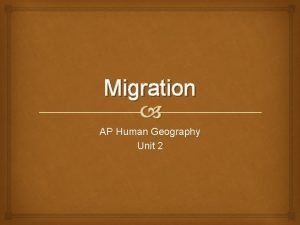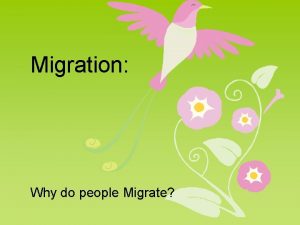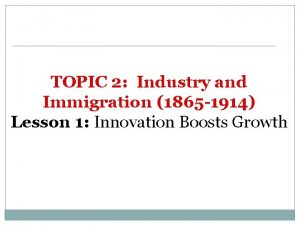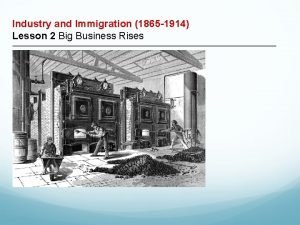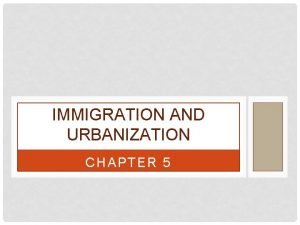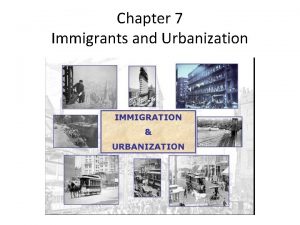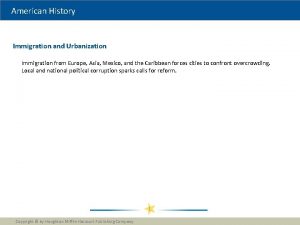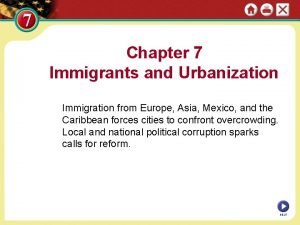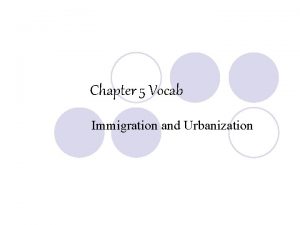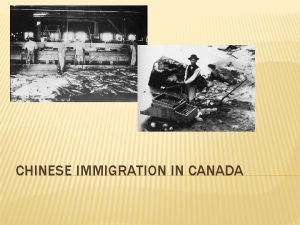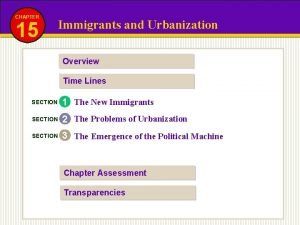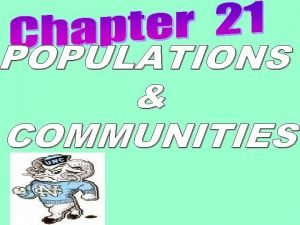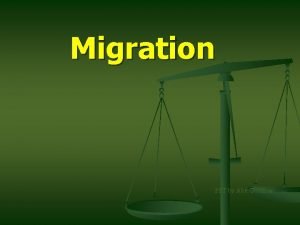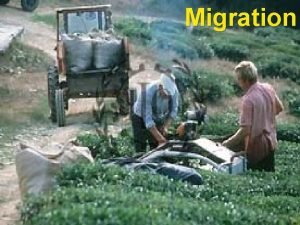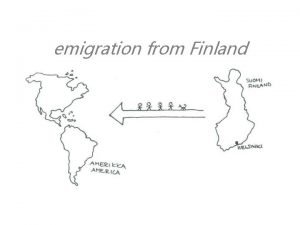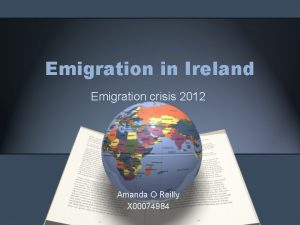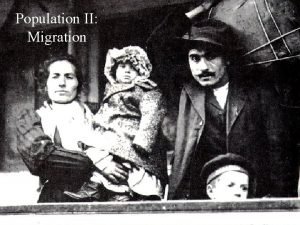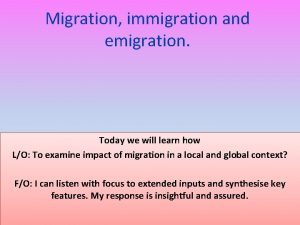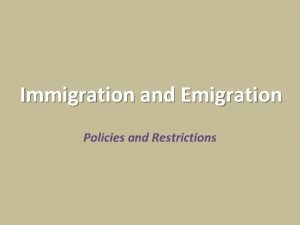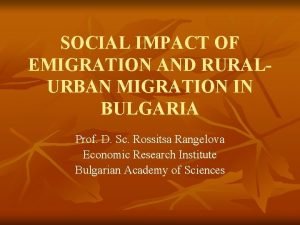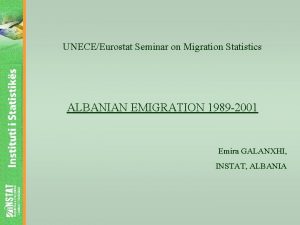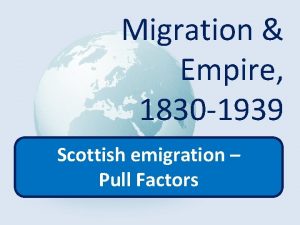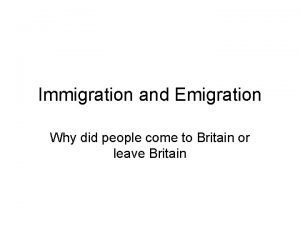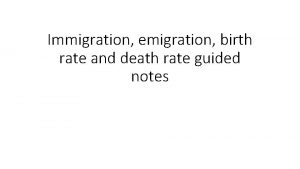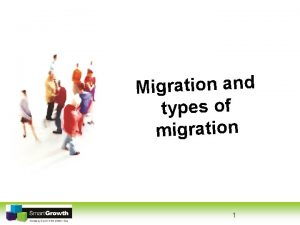IMMIGRATION AND EMIGRATION WHAT IS IMMIGRATION Immigration Migration



















- Slides: 19

IMMIGRATION (AND EMIGRATION)

WHAT IS IMMIGRATION?

Immigration: Migration to a place in order to settle there Emigration: Migration from a place to settle in another place

TO CLARIFY… v. Immigrate means to come into another country to live permanently. v. Emigrate means to leave one's country to live in another. v. Migrate is to move, like birds in the winter. v. The choice between immigrate, emigrate, and migrate depends on the sentence's (and speaker’s) point of view.

A SHORT VIDEO ON IMMIGRATION “This is Why People Migrate” You. Tube channel: AJ+ NOTE: What do you know about this source? Published on Aug 3, 2014 Immigrants, migrants and refugees are often in the news — but why do people get up and leave their homes in the first place? AJ+ host Dena Takruri explains the root causes behind migration around the world. https: //www. youtube. com/watch? v=s. QHHNuc-1 u. A

TABLE TALK Were your parents born in the United States? Your grandparents? Your cousins? Do you have a neighbor or friend who moved here from another country? Was it recent or long ago? Share with your table your personal stories of immigration and emigration.

HOMEWORK Ask a trusted adult about your own family. Use these guiding questions: How did they come to be in the United States? Where did they leave and why? Is anyone in your family a citizen of another nation? More than one nation? Ask your trusted adult if they are comfortable with you sharing the story. Take notes to bring to class.

DISCUSSION QUESTIONS Why do people migrate? People migrate for many different reasons. These reasons can be classified as economic, social, political or environmental: economic migration - moving to find work or follow a particular career path social migration - moving somewhere for a better quality of life or to be closer to family or friends political migration - moving to escape political persecution or war environmental migration - causes of this type of migration include natural disasters such as flooding Some people choose to migrate (e. g. someone who moves to another country to enhance their career opportunities). Some people are forced to migrate (e. g. someone who moves due to war or famine). A refugee is someone who has left their home and does not have a new home to go to. Often refugees do not carry many possessions with them and do not have a clear idea of where they may finally settle.

ELLIS ISLAND

v. Ellis Island is an island in the Upper New York Bay in the Port of New York and New Jersey. v. It was the gateway for millions of immigrants to the United States as the nation's busiest immigrant inspection station from 1892 until 1954. v. The island was made part of the Statue of Liberty National Monument in 1965, and has hosted a museum of immigration since 1990. v It has been estimated that nearly half of all Americans today can trace their family history to at least one person who passed through the Port of New York at Ellis Island.


v. From 1892 to 1954, over twelve million immigrants entered the United States through the portal of Ellis Island. v. If the immigrant's papers were in order and they were in reasonably good health, the Ellis Island inspection process would last approximately three to five hours. v. The inspections took place in the Registry Room (or Great Hall), where doctors would briefly scan every immigrant for obvious physical ailment. v Doctors at Ellis Island soon became very adept at conducting these "six second physicals. "

YOUNG IMMIGRANTS http: //teacher. scholastic. com/activities/immigration/young_immigrants/

VOCABULARY (COPY INTO YOUR BINDER) Immigrant: A person who comes to live permanently in a foreign country. Emigrant: A person who leaves their country permanently to become a citizen of another. Citizen: A legally recognized subject or national of a state or commonwealth, either native or naturalized. Refugee: A person who has left their home and does not have a new home to go to.

VOCABULARY (COPY INTO YOUR BINDER) Naturalization: Process of becoming a citizen and being given all of the rights and privileges that go with it Naturalized US citizen: One who, being born an alien, has lawfully become a citizen of the United States under the US Constitution and laws. He/she has all the rights of a natural born citizen, except that of being eligible as president or vice -president of the United States. Quota: The number of persons permitted to immigrate to a country. Deportation: The lawful expulsion of an undesired alien or other person from a state.

VOCABULARY (COPY INTO YOUR BINDER) Primary resource: Primary resources provide firsthand evidence of historical events. They are generally unpublished materials such as manuscripts, photographs, maps, artifacts, audio and video recordings, oral histories, postcards, and posters.

LETTERS HOME

CLASS WORK Choose a letter from one of the packet on your table. Read it individually, considering the following guiding questions: 1. Who is this person? 2. How old might they be? 3. Why might they have immigrated to the United States? Why might they have emigrated from another country? 4. How do they feel about being in the US? About leaving another country? 5. What in the letter lead you to these ideas?

WHAT ARE WE DOING NEXT? This grading period we will be studying immigration and emigration through fiction and nonfiction texts. You will create fiction using nonfiction texts for inspiration and information. You will do research, use various primary resources and create a research paper. You will learn to use graphics to enhance your research paper (nonfiction text). You will create a bibliography.
 Migration key terms
Migration key terms Emigrant v immigrant
Emigrant v immigrant Interregional migration ap human geography
Interregional migration ap human geography Intervening opportunities
Intervening opportunities Emigration ap human geography definition
Emigration ap human geography definition Topic 2 industry and immigration
Topic 2 industry and immigration Topic 2 industry and immigration
Topic 2 industry and immigration Industry and immigration lesson 2
Industry and immigration lesson 2 Chapter 5 immigration and urbanization
Chapter 5 immigration and urbanization Chapter 7 building vocabulary immigration and urbanization
Chapter 7 building vocabulary immigration and urbanization Chapter 7 building vocabulary immigration and urbanization
Chapter 7 building vocabulary immigration and urbanization Immigration and urbanization new technologies lesson 4
Immigration and urbanization new technologies lesson 4 Chapter 7 building vocabulary immigration and urbanization
Chapter 7 building vocabulary immigration and urbanization Chapter 5 immigration and urbanization
Chapter 5 immigration and urbanization Chinese immigration push factors
Chinese immigration push factors Chapter 15 building vocabulary immigration and urbanization
Chapter 15 building vocabulary immigration and urbanization Human impact on oceans
Human impact on oceans Push and pull factors of migration ppt
Push and pull factors of migration ppt Radial and tangential migration
Radial and tangential migration What is the immigration
What is the immigration


